#Battle of Cambrai
Explore tagged Tumblr posts
Text

Destroyed British tank in Rumilly, France during the Battle of Cambrai. Nov/Dec, 1917
43 notes
·
View notes
Text
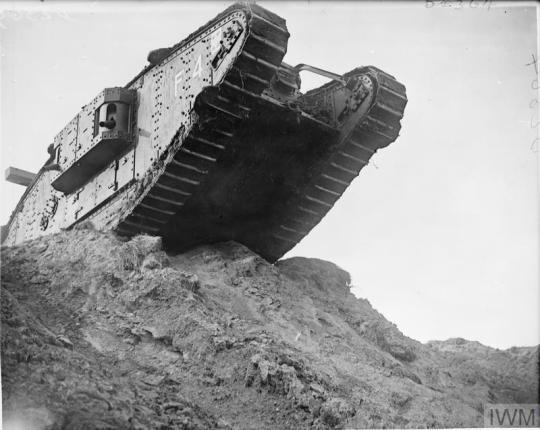
Tank F4 poised on top of a rise which it is about to descend at the Tank Driving School during the special training for the Battle of Cambrai at Wailly, 21 October 1917.
#ww1#ww1 poetry#ww1 history#history#historical photos#american history#military history#world war i#world war one#the great war#The First World War#the great war 1917#historical photography#photography#vintage photography
79 notes
·
View notes
Text
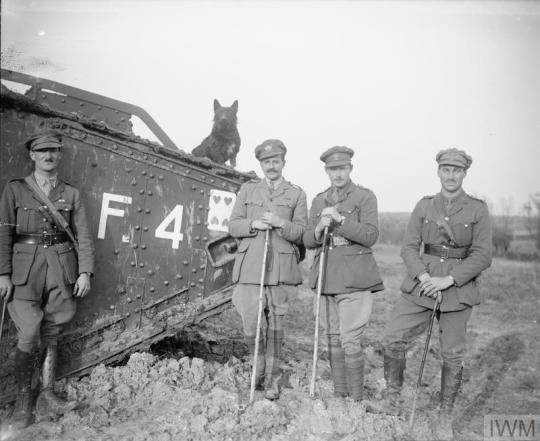
Image: IWM (Q 7278) Photograph taken at the Tank Driving School during the special training for the Battle of Cambrai at Wailly, 20 October 1917. Over 400 tanks were gathered for that training.
43 notes
·
View notes
Text
"The Boche is managing his attack another way; he is practicing it very much like he did at Cambrai. First they have a creeping barrage, probably like ours. Next to that he is going to have a smoke barrage made by hand grenades. After that he is putting his eggs in the Storm Trooper basket. These fellows are specially trained and they are really very fine men. These Storm Troops and machine gunners are the only good people on foot in the German Army. All infantry Battalions are skinned of their best men to put into the Storm Troops. It is therefore important that you should defeat these Storm Troops; one Storm Troop knocked out is worth a lot."
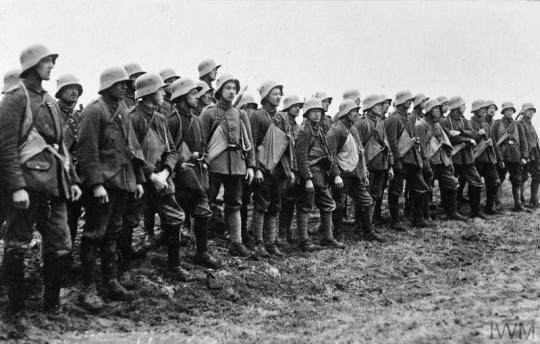
"In the German scheme they and the light machine guns are to go straight ahead and not stop for anything; they will not stop in your line. They are followed immediately behind (about 200 yards behind) by masses of Infantry, so that if you massacre the Storm Troops and get the SOS going you will have a fine time. The Hun idea is that the Storm Troops will make holes and continue their advance past our strong points. They having been training them to go 12 kilometres about 7 miles, the first day. That might do for the Italians and the Russians, but it will not do for you. Not if you are in depth. "
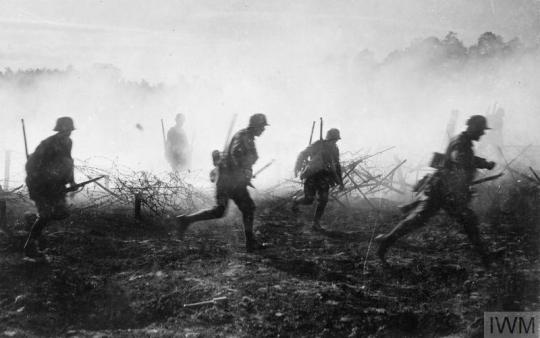
"Then the Infantry following behind is to mop up, moving right and left from the breaches thus made. There will be a very careful reconnaissance and these will now move up the hollows to avoid being seen by our artillery. That is what they did at Cambrai. One lot goes one way and another lot the other way and the Storm Troops go right on. They expect to paralyse you by the sudden onslaught of these Storm Troops, but you have only got to watch properly and have your men to shoot and then you will be alright."
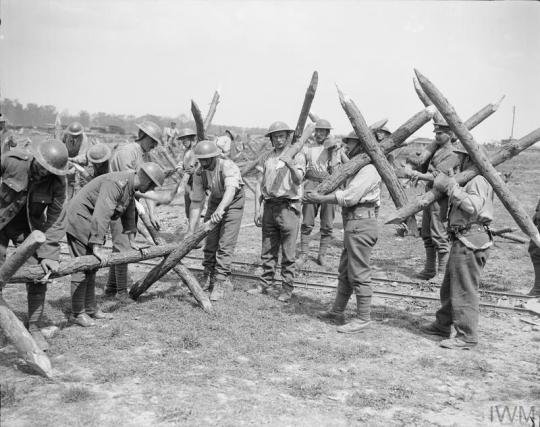
"With the wire you have in front of you and the arrangements we are making, provided you will patrol No Mans Land and will teach Musketry to your Sections I don’t think the Boche has a dog’s chance." Lieutenant-General Ivor Maxse on the lessons learnt from the Battle of Cambrai, 12/2/1918.
Maxse's 18th Corps was part of the British Fifth Army that bore the brunt of the German Spring Offensive in March 1918. Maxse's training had paid off, and despite suffering heavily they withdrew in good order and never broke the same way much of the rest of the Fifth Army did.
56 notes
·
View notes
Text
Prohibition AU | Character Profile: Percy
When it comes to criminal affairs, a strong external ally can be just as vital to a racket as the strength of the racketeer themselves; and when it comes to strength of any kind, Detective Percival King is as good as anyone can ask for. Having left the lead-littered ruins of the Great War behind her, Percy now battles to maintain peace and safety in the criminal boiling pot that is the United States, under the overwatch of a deal made with a certain crime family.
Background.
Born in a village bordering Cambrai, Percival King was dropped right into the middle of the Belle Époque, and her life in France was largely defined by a short-lived era of societal overhauls and tumultuous politics. Gifted with a preternatural precocity and a portfolio of peculiar interests which included masonry, engineering, law, and swordplay, she swiftly and thoroughly took to educating herself on all topics immediately and potentially relevant to her life, before it was so violently disrupted by the advent of the Great War.
When war arrived in France and the German army struck Cambrai, Percy took it upon herself to help her country fight back in any manner possible. Usually, this involved playing the role of field medic, building and repairing makeshift fortifications ad nauseam, and even manning the guns and mortars herself, if not duelling enemy combatants in person. She had long become accustomed to the rhythms and rituals of battle by the time she was forced to evacuate by the oncoming Battle of Cambrai.
Following the scorching of the city and the German forces’ retreat, and after managing a sincere—if vain—attempt to restore her hometown, Percy eventually followed a close friend to the States in search of new opportunities. Managing to bring along an entire mortar from the battlefield, she soon landed a career in law enforcement in the small, border-facing Sweet Jazz City, where her talent for crime-fighting and fighting in general soon attracted the attention of the city’s most prominent crime family. And thankfully, one more interested in peace and order than violence…somewhat.
Relations.
Despite taking a healthy caution in regards to the members of Bliss Ocean, Percy does have her share of attachments within its ranks. Chief of which are her surrogate affection for Molly Blyndeff and her close friends, as well as her unexpected acquaintance with Professional Lying Rat Bastard™ Ramsey Murdoch, who occasionally helps her administrate the balance of order and chaos in the city.
Deeper within Bliss Ocean’s ranks, Percy often remains contentious towards the family’s less savoury members, but she does hold some duty of care for the younger Sylvie and Giovanni, as well as recognising and highly respecting the former’s precocious talent, and she does her best to reciprocate Rick and Indus’ endless (if unsettling) friendliness towards her. She keeps her distance otherwise, but expressly appreciates what loose morality and discipline the family occasionally displays.
Bliss Ocean Report.
It’s nothing new for criminal syndicates to pay off or work with the slouches and sleazebags of law enforcement to dodge the ire of its more thorough officers, especially come the legislative fustercluck that is the Eighteenth Amendment. However, when along comes a detective so lightning-minded, so capable yet eccentric, so dedicated and yet empathic as Percival King, how could I not chance the risks to add her boon to our family’s firepower?
Far and away one of the most capable members of Sweet Jazz City’s police force, all of Detective King’s apparent quirks seem to disappear in the heat of battle behind a commanding assuredness and flurry of combat prowess. Her military history is readily visible in her tactical wit and preference for the longsword over conventional urban weaponry, and for someone with such a seemingly absurd moral code, she can be deceptively pragmatic and crafty in combat, especially when lives are at stake.
Having had the great pleasure of discussing civil matters with the great detective on several occasions, her unique mind stands out even past the little absurdities of her personality, and perhaps even in service to them. She has a distinctly…three-dimensional perspective to things, both in and out of combat, directly informed by her passion for engineering and extensive experience in rural warfare. Even her defensive, counter-focused fighting style and acrobatic skill seem apparent to me in our conversations, in the way she observes and reacts to situations.
Dr. Ashling and I can best describe Percy’s psychological profile as…’circular’. Every part of her craft, skillset, and fighting style owes itself to, and in turn heavily influences, every other part of her mindset and personality. Perhaps this interconnected web of principles, insights, and spatial awareness is also the explanation for the fact that she owns a mortar. A…mortar. From the war. A mortar that—perhaps fortunately so—sees little use in her line of work…so far. Time will tell whether her symbiosis with our little syndicate will necessitate its deployment once more.
On the subject of her relationship as a police detective to Bliss Ocean, though…being honest, I’m not worried. As I’ve said, Percy can be surprisingly pragmatic, and so far she’s been more than willing to look at things from my perspective. More importantly, she trusts my word, and recognises the value in our grip over the city’s underworld. She’s even begun to acquaint herself with some of our family, most notably Molly, for��what I suppose are obvious reasons. In any case, it’ll be interesting indeed to see how we can fully utilise her unique capabilities…
- Naven
#epithet erased#epithet erased au#epithet erased prohibition au#prohibition au#percival king#epithet erased percy#naven nuknuk
13 notes
·
View notes
Text

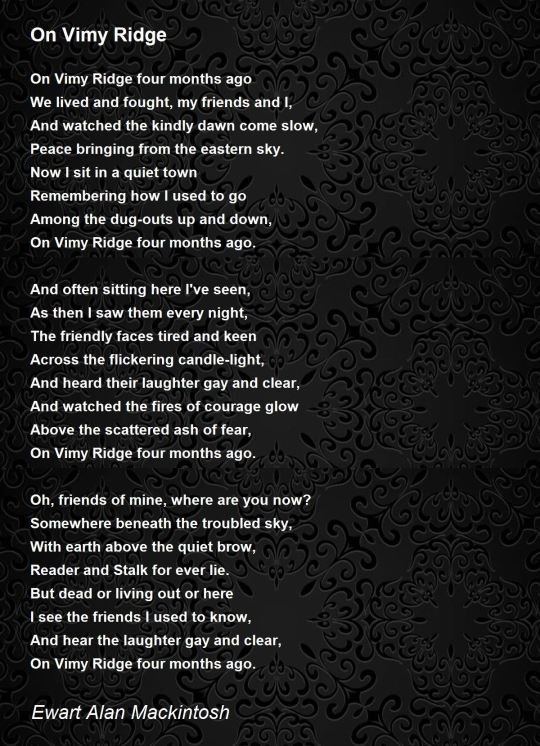
On November 21st 1917 Lt Ewart Alan Mackintosh, author of the poem Cha Till Maccruimein, was killed on the second day of the Battle of Cambrai.
Although born in Brighton, of Scottish parents, Mackintosh learned to speak Gaelic and was an accomplished piper. Fishing trips with his father to the Alness area and Highland holidays with two university friends nurtured his sense of Scottishness.
In 1916 during a raid, north of Arras three of his men had arms or legs blown off; despite his struggles to carry them back in, they all died. The action brought him the Military Cross, though he wrote that he would ‘rather have the boys’ lives’. It also inspired one of his best-known poem, ‘In Memoriam’.
These lines from Mackintosh’s poem ‘A Creed’ are engraved on the Scottish American War Memorial in Princes Street Gardens in Edinburgh:
"If it be life that waits I shall live for ever unconquered, If death I shall die at last strong in my pride and free"
Cha Till Maccruimein* (Departure of the 4th Camerons)
The pipes in the street were playing bravely, The marching lads went by, With merry hearts and voices singing My friends marched out to die; But I was hearing a lonely pibroch Out of an older war, ‘Farewell, farewell, farewell, MacCrimmon, MacCrimmon comes no more.’ And every lad in his heart was dreaming Of honour and wealth to come, And honour and noble pride were calling To the tune of the pipes and drum; But I was hearing a woman singing On dark Dunvegan shore, 'In battle or peace, with wealth or honour, MacCrimmon comes no more.’ And there in front of the men were marching, With feet that made no mark, The grey old ghosts of the ancient fighters Come back again from the dark; And in front of them all MacCrimmon piping A weary tune and sore, 'On the gathering day, for ever and ever, MacCrimmon comes no more.’
Ewart Alan Mackintosh (1893-1917)
14 notes
·
View notes
Text
I'd Do Anything
Part Four Tommy Shelby x Reader
You met when you were sixteen and from there, your lives ebbed and flowed closer and further away from one another but there was always something that brought you together.
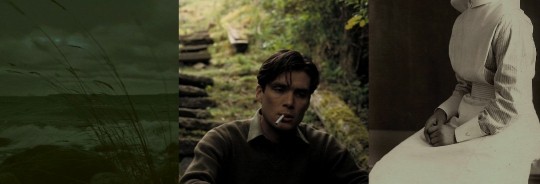
”*°•.˜”*°•. ˜”*°•. ˜”*°••°*”˜.•°*”˜.•°*”˜.•°*”˜
previous chapter
September 1918
It had now been three and a half years since you'd seen Tommy in person and some parts of you debated whether you fit into one another's lives anymore. Whenever you would eventually be reunited, nothing was guaranteed. The love you had before wouldn't be the same, you wouldn't be the same people or know how to interact like you did before. Everything would be so different. It was incredibly daunting but you didn't give too much time to those thoughts. You knew being close to the front of the second 1918 battle of the Somme was as close as you would get to Tommy for a while now. Assuming he was even in those trenches, the two of you hadn't spoken through letters for so long by this point.
You'd been writing to Polly the last few months. After many attempts to create a dialogue between you and Tommy you gave up, he wouldn't write back and soon you lost track of where his battalion was stationed. It seemed futile to try anymore so you wrote to others who wanted to hear what you had to say. Polly told you to focus on your work and not think about him. But it seemed harder with every day that passed, the more you felt disconnected from him. The string that had attached the two of you together since you were young felt like it was fraying.
Every small thing that had happened in your life felt insignificant when you looked into the eyes of soldiers. Your pain, your anguish paled in comparison to theirs. Even their eyes looked haunted, it was the worst at night on the ward when men would wake up screaming and then they would be sent back to the front once again. Sometimes they would beg to not be sent back, praying to God for their death to be quick and every night you seemed to be haunted by the possibility that Tommy longed for the release of death.
He didn't think he would be so close to the same front for so many years. He was only 25 miles away from where the Battle of the Somme had taken place. Digging out trenches for infantry and doing all the grunt work tunnelers preferred to their normal role underground. Tommy was just glad to not be back in La Bassée digging deep concrete dugouts during the cold winter last year. He was lucky he hadn't got frostbite on most days, it was relentless hours with few breaks and the constant anxiety that they would hit a mine or a water source that would flood the dugout.
Tommy never thought he'd be glad to be digging out trenches but he was, there was order and a method to all of it. After the Germans stabilised their trenches clay-kickers and engineers were ordered to dig stronger defenses with even deeper dugouts. All he could do was pray to a God he knew didn't exist that they wouldn't put him back underground. Mines weren't being used anymore but Tommy wouldn't believe he was free of the torment until the war was over. He couldn't do it again, he refused to hear the shovels again.
The Second Battle of the Somme ended in early September and you were reassigned to Hèbuterne. As you approached late October there were more and more whispers that a peace deal might be reached- irregardless of how impossible that seemed with the amount of casualties being reported.
The unlikely outcome of peace talks was reaffirmed when you were relocated again to Cambrai. There to give medical assistance to the allied forces pushing the German forces using tanks and other heavy machinery. In two days 12,000 allied men lost their lives and it was a victory. This fatality toll was better than earlier battles and you couldn't quite believe the brutality of it all. Soldiers recovering discussed how they had breached the Hindenburg Line. You wished you could talk to Tommy about it all, where was he? No one knew where tunneling units were given; it was supposed to be more secretive.
Your station didn't change for a while, you were to act as a walking wounded CCS and also a rest station for the XXII Corps. You always hated being a walking wounded CCS, it often felt like sending lambs out to slaughter after you had looked after them. Looking into those soldiers' eyes as you cleared them for duty after stitching them back up when all they wanted was to go home. Their eyes would plague your dreams more than when they would plead for a quick death, some of these men you had seen multiple times and by this point they wouldn't even plead.
After a week or so you walked into the huts to check on new patients as walking wounded was essentially a rotating door.
“Bullet only grazed you I see?” you asked, walking up to the first man.
“Y/n?” The voice asked and you looked up from your tray of sterile needles and implements. It was Arthur. The Arthur who had teased you and treated you like a brother for so many years, he looked like a frail shell.
“I-” you faltered before your eyes began to well up, it had been so long since you had seen anyone you loved that you didn't know how to react. Arthur just reached out and held your shaking hand.
“Come on, let's get this sorted and we can talk.” Arthur said softly, in the kindest voice you had ever heard. It refocused your brain, you went into an autopilot state of mind. You became a sister again, devoid of identity and there to help. After he was patched up your hands started shaking again and you both walked out to get some extremely watered down tea-it was essentially hot water.
The two of you sat down on a bench together, your dress covered in mud and a bit of blood on your sleeves, Arthur didn't look much different. There was a respectable distance between the two of you but you wanted to hug him so badly it was infuriating.
“I'm so glad you're alive.” Was all you could say.
“I could say the same for you. A lot of these places get bombed.” Arthur stared out at the littony of men under makeshift tents on stretchers.
“I'm not unfamiliar with it.” You paused, “Where have you been? Do you know where the brothers are?”
“I've been all around it feels like. Pulled from one place to another getting patched up and sent out again, it's a never ending cycle until I finally get shot on the head.” He spoke plainly and without emotion, every now and then bringing the mug to his lips.
“Cigarette?” You asked, offering him one. “I'm not exactly supposed to smoke but I don't know if it will matter after long, we could all be dead tomorrow.” Arthur brought out some matches and lit both of your cigarettes as you simultaneously breathed out smoke.
“I'm glad you're not in the trenches. I'm glad you're here but not any closer. I don't think I could take losing someone else, I haven't seen either of the boys in months, maybe years I can't remember.” Arthur looked up at the sky and placed his empty mug next to him on the bench. “It feels like time just throws you along, I don't think I've felt like a person until this very moment. I know I'll have to go home at some point but I don't think I'll ever feel human again.”
“Don't say that.” You turned to him.
“There's never just one direction, it's this fight then, this battle, then this wound, then this hospital and all of it round and round and round. My life is stuck in this fucking loop and my head… my head can't fucking live with it, I- I think I might be broken, Y/n.” Arthur looked at the ground with a sad expression, maybe it was pity for himself you weren't sure.
“There's rumors of peace talks.” You offered and he scoffed.
“It's just more fucking words. Words won't save anyone until they fucking mean something.” Arthur stubbed out his cigarette and stood up. “I need to report back, I think-” before he could finish you enveloped him in a hug that was so tight you thought he might burst. You held you close and sighed.
“I feel like a child when I hug you, like it all goes away and we're playing together in the street again.” You said quietly before drawing apart.
“It will never be like that again, Y/n. The sooner you accept that, the sooner you can try to live.” Arthur said with such sadness in his eyes before turning and heading towards his commanding officer to report back.
It was only a month later when the bloody thing ended. Even later than the 11th of November when you could finally go home. Transport was full, boats even fuller and you feared catching some sort of illness so you stayed. Liaising with nurses near Cambrai to help locals with any medical issue, writing to Polly and even traveling around in a mobile medical vehicle to make sure no one was left behind. It took close to two months and you all but forgot that you'd missed Christmas when you arrived back in Birmingham.
At no point had you ever taken leave. You didn't see the point since you knew you wouldn't want to go back to the front and it was your duty to be there. What could you do in Birmingham? Run the betting shop? What would be the point when everyday people were dying and you could have helped prevent some of it? No, you had made the right decision.
Tommy didn't know what to do with himself. He stared up at his ceiling with a blank mind, his eyes sunken with dark circles. How could he sleep when he heard the same thing, the shovels. The war hadn't killed him but he was convinced that he could be the one to do it.
“Thomas,” Tommy heard Polly call “Come downstairs.” He regrettably stood up and rubbed a hand down his face before walking downstairs, hearing surprisingly happy voices.
“I thought you'd never come back!” Finn yelled excitedly before jumping into someone's arms.
“She wasn't going to leave any of us, were you dear?” Polly asked with a raised eyebrow and then he heard your laugh- there was less emotion behind it.
“How could I ever leave such a troublemaker like you! Someone's got to give Polly a break.” You put Finn down and smiled at him.
Your gaze rose to the man in front of you, Tommy. Your Tommy. He didn't look like the man you remembered but you didn't care, you walked toward him and enveloped him in the same hug you gave Arthur months ago.
“I'm so glad you're alive.” You whispered close to Tommy's ear and his arms wrapped around you timidly at first before pulling you even closer.
It was your smell that made Tommy emotional. Not replying to letters kept home at an arm's length but when he had come home for a weekend's leave it would always be Finn asking for you that left a bitter taste in his mouth. He knew it was wrong to thrust you away with a lack of replying but he just couldn't do it.
“Tom, where is she?” Finn asked in a quiet voice as Tommy sat by the fire still in his uniform taking his boots off.
“She might not have been allowed to come home yet.” Tommy answered.
“But you're here? Are you not together?” His eyes looked even sadder.
“We both have important jobs but they don't work together,” Tommy paused. “I miss her too.” He replied looking into the fire.
“Why couldn't you come home?” Tommy buried his face in your neck and his words were slightly muffled. Polly pulled Finn by the hand and took him into the kitchen to give both of you some time.
“What did you say?” You asked softly, pulling back slightly. Tommy's head was bowed a small dim beam of light highlighting his jaw perfectly- his hair flopped over his face and you noted to take him to the barbers soon.
“Why didn't you come home?” He asked quietly and your breath hitched in your throat. “I understand what it's like out there. Polly and Finn won't understand but I do, even more so and I came back.”
“I couldn't bear it.” You said after a few moments, you walked forward and sat down on one of the steps of the creaking stairs. “I didn't know if any one of you was alive, I couldn't face this house without any of you. If I focussed on my work, on my routine, then I didn't think about if you were dead.” You looked at Tommy as he sat next to you, “You stopped writing. I thought you might be dead and Polly didn't have the heart to tell me.”
“Writing to you gave me solace at the start. When we all thought it would be over soon with some fucking diplomatic intervention,” he laughed coldly. “The further it got into the nightmare the more I didn't want to bring you into it.”
“Everything has changed from who we were before. But we can trust one another like never before.” You put your hand over his.
“And why can we trust one another more than before?” He asked with a slightly concerned face.
“Because at one or multiple points in the last few years, we have seen death or thought we were about to die. We're both broken.” Your finger traced up and down the top side of his hand.
The two of you sat in silence for a while, until Tommy turned his head to look at your face and the both of you hadn't realised how close you were. You had both aged and matured in different ways, both of you had a sadness behind your eyes that had never been there before. Being plagued by memories of such intense suffering had an impact, long hours and lack of proper nourishment making the two of you look very different to how you remembered. But it didn't matter, you were each other's person in one way or another. Leaning your foreheads against one another, your head's went quiet for a moment- you couldn't hear the screams of agony and Tommy could no longer hear the shovels.
Peaky blinders taglist: @queenofkings1212 @severewobblerlightdragon @cl5369 @fairypitou @stressedandbandobessed7771 @shadow-of-wonder @hipsternoionlylikeunicorns @curled-hair-red-lips @lucystivinsky1315 @lovemisshoneybee Series taglist: @swordofawriter @jessimay89 @globetrotter28 @marcysbear
#peaky blinders#tommy shelby#tommy shelby imagine#tommy shelby x reader#tommy shelby imagines#tommy shelby angst#peaky blinder fanfic#peaky blinders imagine#tommy shelby x you#tommy shelby x y/n#peaky blinders imagines#peaky blinders fanfic#bbc peaky blinders#peaky blinders tommy shelby#peaky blinder imagine#pre war tommy shelby#tommy shelby fluff#tommy shelby fiction
120 notes
·
View notes
Text
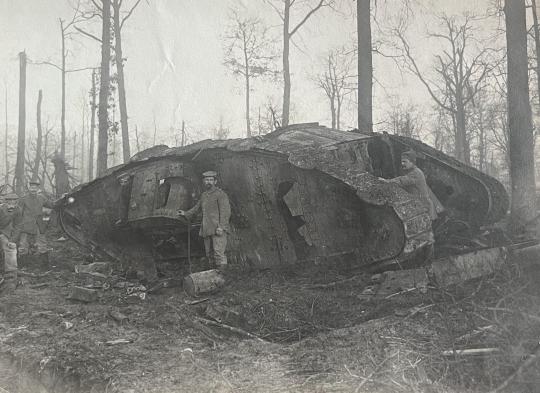
German troops inspect the remains of G Battalion British Mark IV tank G34 "GHURKA" knocked out at Bourlon Wood during the Battle of Cambrai on November 23rd 1917.
7 notes
·
View notes
Text
Military prowess, chivalric values, and crusading piety were also key elements of Ida II of Boulogne’s reputation and patronage. Ida, raised at the renowned Flemish court, was noted for her love of tournaments, romances and poetry, and court life in general. In the Tournoi des Dames, Ida is depicted in the company of the queen, Jeanne, countess of Flanders, and the countesses of Clermont and Champagne, all of whom were her relatives and from noted crusading families of France and Champagne. Helen Solterer argues that the depiction of these women as committed crusaders, pious and skilled, affirmed women’s contributions to the crusades and their status within society. The poem enhanced Ida’s reputation as a most noble, courteous woman descended from distinguished crusaders of Boulogne, Blois, and Flanders.
Ida’s third husband shared her reputation for courtoisie and chivalry. The castle of Hardelot was their preferred residence; a place for leisure and fun. Trouvères— Simon, Jehan the cleric, and Gerard of Boulogne—also frequented their court. Renaud was also known for his elegant manners and dress, his military skill, devotion to friends, and eloquence. His skill is lauded in the History of William Marshal and even by Guillaume le Breton in Philippide.
His unbridled valor did not allow anyone to vanquish him; it did not matter whom his arm reached, he could [always] walk away the winner, so well could he handle weapons with ability and prudence, so much the prowess which was natural to him in battle loudly proclaimed that he was the true issue of French parents.
His reputation as a preudomme may be reflected in a chronicler’s story that Renaud would forgive the count of St. Pol’s punch in the nose “as soon as the blood is restored to his nose,” a phrase mirroring one said in Raoul de Cambrai.
Their reputation for courtoisie was enhanced by their conventional piety. In addition to their ecclesiastical patronage, Ida II was the dedicatee of the Boulonnais poet’s Li Pater noster and her husband Renaud was the patron of the Roman de Siperis de Vinaux, which focused on proverbs and moral sentences, as well as some humour.
Chivalry, crusading, and piety were the major themes of the most well-known work that Ida and Renaud commissioned—a French translation of the Latin Pseudo– Turpin. The Turpin prologue champions a revival of chivalric virtues and encourages the emulation of the exemplary model of Charlemagne and the moral benefits of crusading. The importance of chivalry is particularly highlighted in the prologue of Renaud’s translation:
Good virtues are almost completely gone from the world, and the courage (or the heart) of the great lords is weakened, for we do not see at all as often as one would like the deeds of the preudhommes and the old stories in which we find how one should behave towards God and live an honest life.
This version of the Pseudo-Turpin, which became one of the more copied of this text, includes a genealogy of the Boulonnais comital family. It is not based upon the late eleventh-century genealogy which established the family’s Carolingian descent and promoted their status as territorial princes, of which there were at least fourteen copies available in regional monasteries. The numerous copies of the eleventh-century genealogy, in houses not directly patronized by the Boulonnais comital family, attests to the fame and significance of these leaders of the First Crusade and the establishment of the crusader kingdom of Jerusalem. Johannes, the translator of Renaud and Ida’s Pseudo-Turpin, created a new genealogy, which asserted that King Arthur established the first count of Boulogne, Legier, one of whose descendants was St. Waumer and another was Quites, one of the twelve peers of Charlemagne, whose son Oto took on the traitor, Ganelon. Oto’s granddaughter, Berta, marries Ernekin, son of Baldwin, count of Flanders. Their grandson, Guy White-Beard, count of Boulogne, Ternois, and Montreuil, had three sons—Baldwin, count of Boulogne, Hugh, count of St. Pol, and William, count of Guines. This count Baldwin is the father of Eustace I and grandfather of Eustace II, who, on returning from a pilgrimage in Rome, meets Ida, granddaughter of the Swan Knight. Their sons are Eustace III, count of Boulogne, and Godfrey and Baldwin, kings of Jerusalem. Eustace III and Mary, daughter of the king of Scotland, produce Matilda, who married King Stephen of England. Their children are William Longsword, Eustace IV, and Marie, who married Matthew, brother of Philip, count of Flanders. Marie and Matthew’s two daughters are Ida, countess of Boulogne, and Matilda, duchess of Louvain/Brabant.
Gabrielle Spiegel and others have noted that the genealogy is wrong in several places (some suggest that the Carolingian descent is fictitious) and state that it is unclear whether Ida and Renaud knew it was wrong. This seems unlikely given the numerous copies of her family’s genealogy in local and regional monasteries. Not only does the new genealogy add luster to the family with the inclusion of a new saint (Waumer), but also by attributing their comital status to King Arthur. The author and his patrons drew upon Wace’s presentation of Arthur’s kingship as morally superior. Arthur’s civilized kingship motivated harmony among his nobles, great chivalry, and peace and prosperity in his kingdom. As such, it pointedly illustrated Philip II’s failure to do so, while at the same time calling attention to Ida II’s Wessex, Scottish, and Anglo-Norman royal heritage. It also focuses on the successes of the First Crusade and Charlemagne, through the inclusion of Ida II’s ancestor, the Swan Knight, grandfather of the saintly Ida I, for whom Ida II was named, as well as indirectly critiques the less successful Second Crusade led by Philip’s father, Louis VII.
Contributing to the criticism of Philip II, as discussed by Spiegel, this new genealogy contests royal influence in northern France through the assertion that Ponthieu, Guines, and St. Pol were part of the iretage of Boulogne. The genealogy thereby advances a claim that these territories should be considered under Boulonnais overlordship, a goal which Ida and Renaud pursued. As Fiona Tolhurst suggests, the recruitment of Arthur into the Boulonnais genealogy also draws upon Geoffrey of Monmonth’s exemplary marital model, where king and queen marry for love and share power. Like Arthur and Guinevere and Arthur’s parents, Uther and Ygraine, the Boulonnais countesses and their husbands ruled as equals, sharing power. The celebration of chivalry and aristocratic values in the Pseudo-Turpin drew upon and enhanced Ida’s family’s tradition of courtliness, especially that of her grandfather Stephen, count of Mortain and Boulogne, and king of England, and her father and uncle, Matthew, and Philip of Flanders, as well as that of her husband.
In conjunction with the distinction gained through literary patronage, Ida and Renaud enhanced their prestige through the building of Hardelot and Belle (later known as Bellefontaine) Castles. Hardelot, like the castle of Boulogne, was built on the site of a Roman fort and utilized the stone spolia of the ancient garrison. This imitation of Charlemagne’s building program and translatio imperium emphasized the Boulonnais comital family’s status through appropriation of the romanitas of the Carolingians. Hardelot’s romanitas was enhanced by its nearness to the Roman road. Traveling from Boulogne to Hardelot, one would pass Odre Lighthouse (built by Charlemagne, following in the first-century AD Roman example). The erection of the castle of Belle asserted comital power visually as well as militarily, defending the fosse on the Wimereux river. Through architecture and literary patronage, Ida and Renaud affirmed the distinguished status of the Boulonnais comital family—renowned peers of King Arthur and Charlemagne, distinguished descendants of kings, emperors, saints, courteous ladies, and preudhommes.
Heather J. Tanner, Lordship and Governance by the Inheriting Countesses of Boulogne, 1160-1260
#ida of boulogne#renaud of Dammartin#12th century#13th century#french history#women in history#my post
6 notes
·
View notes
Text
they're adding the battle of cambrai to the next super smash bros as a stage
9 notes
·
View notes
Text
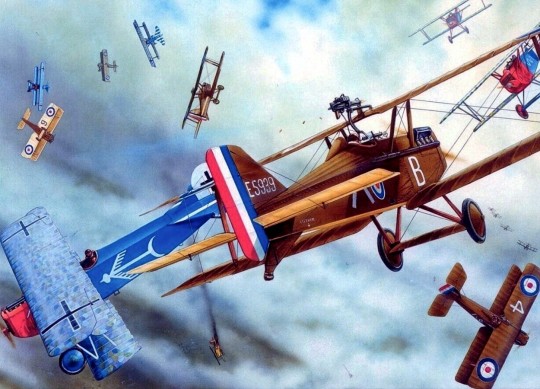
1918 08 10 Amiens, Dogfight RAF 32 Sqn vs Jasta 15 - Peter Dennis
repost better colors
The air operations in support of the ground battle reached their zenith of intensity on 10 August. By this time the RAF effort was shifting back towards the original intention of interdicting the German lines of communications by attacking the key railway centres through which any reinforcements would need to transit. Twelve DH9s from 27 and 49 squadrons were tasked with bombing Peronne railway station escorted by SESas of 32 Squadron and Bristol Fighters of 62 Squadron. As they approached the target from the south-west they were attacked by 14 Fokker DVlls from Jasta 15 led by the ace commander of JG II, Rudolf Berthold. In order to maintain the advantage given by a higher position both attackers and defenders normally split their force with one element placed above the other to act as 'top cover'. Once under attack a defender would attempt to execute a climbing turn towards the attack to bring his own guns to bear, prevent the attacker form getting on his tail and to get above the attacker. As a consequence each combat soon degenerated into a rolling maul of aircraft climbing and turning in search of a killing shot. Flying with 32 Squadron was Second Lieutenant J. 0. Donaldson of the USAS on attachment to the RAF. Donaldson was flying as top cover as 'B5' in SESa E5939 when: " "observed 9 Fokker biplanes, at 13000ft over Peronne, at 1130hrs dive on 3 SE5a). Pilot coming to their assistance, fired 150 rounds into first EA [enemy aircraft) at close range, EA turned over on its back, and went down in a flat spin, and was observed to spin, out of control about 10000ft. Four Fokker biplanes dived on Pilot, who made a climbing turn, firing 50 rounds into second EA without results. Pilot did half roll and dived again, two EA continued to follow, pilot then made another climbing turn, firing 50 rounds into EA without result. Pilot turned and dived under some Bristol Fighters ". Combat report, Second Lieutenant J. 0. Donaldson, 10 August 1918
A passing patrol from the elite 56 Squadron joined in the melee to stack the odds against Jasta 1 5, however, the powerful DVlls were faster and more agile than their opponents and exacted a severe toll from the RAF as one DH9 and four fighters were shot down for the loss of only one German aircraft. Unfortunately for JG II the loss was Berthold who was seriously injured after having his aircraft shot out of control. With no one able to confirm Donaldson's victim's crashing he was only credited with a 'shot down out of control' rather than a kill. Donaldson's luck ran out three weeks later on 1 September at Cambrai where he became the 11th victim of Leutnant Theo Quandt of Jasta 36 and was taken prisoner.
24 notes
·
View notes
Text
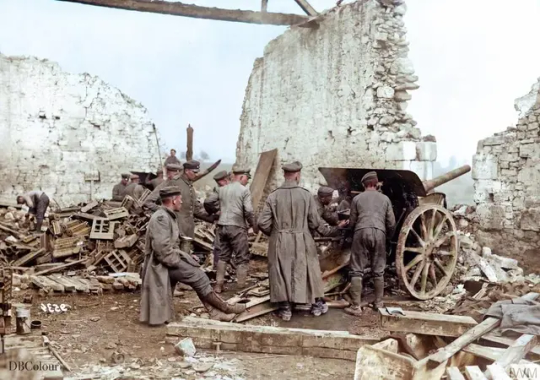
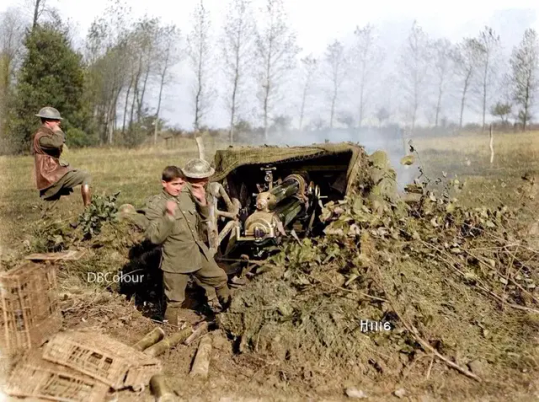
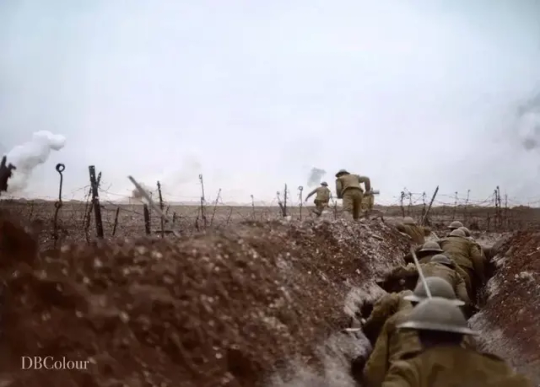
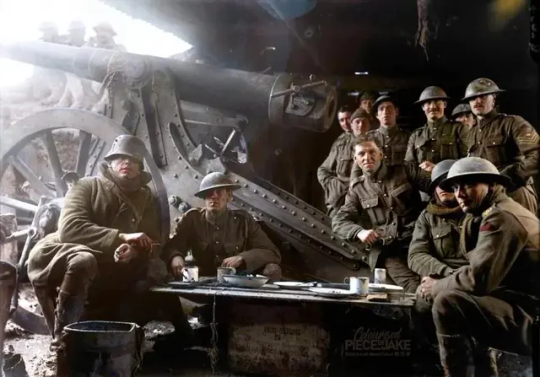
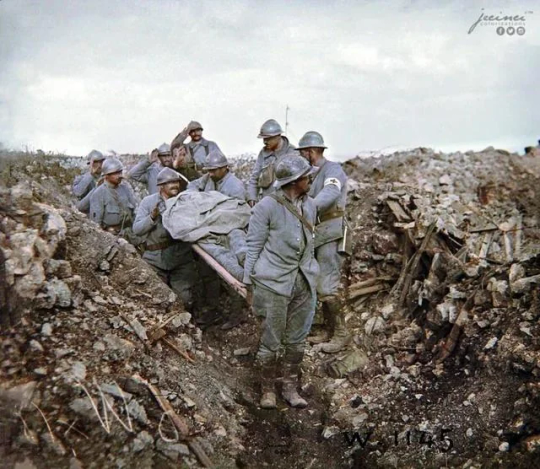
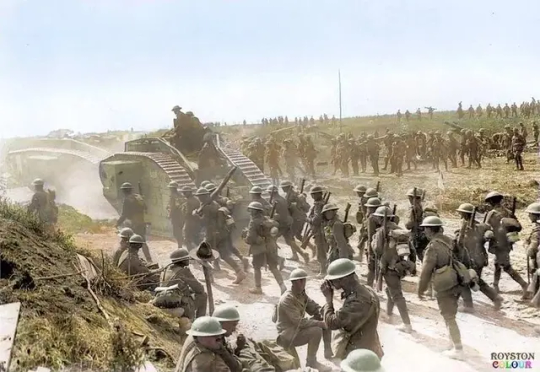
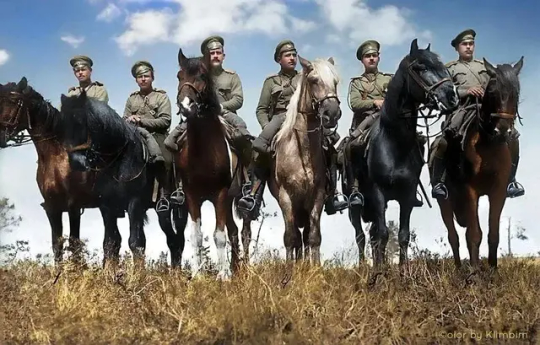
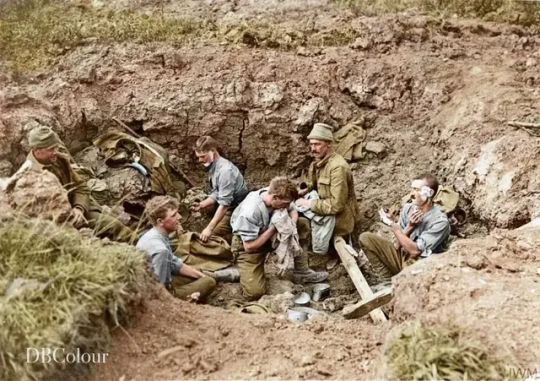
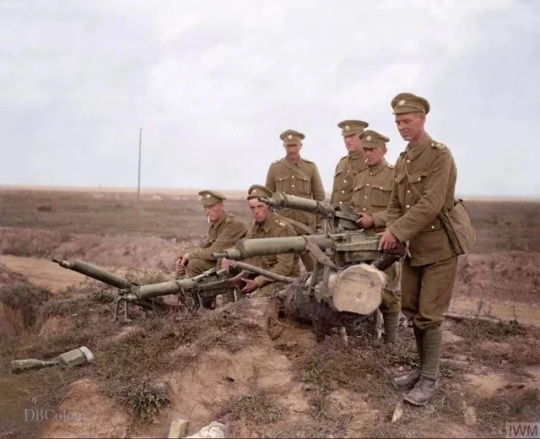
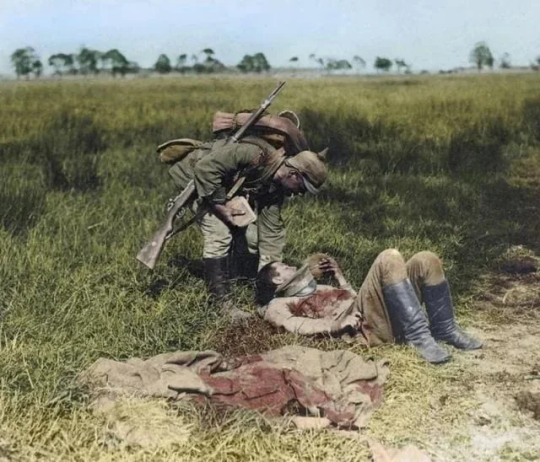
WWI, 28 July 1914 – 11 November 1918 (4 years, 3 months and 2 weeks)
49 notes
·
View notes
Text
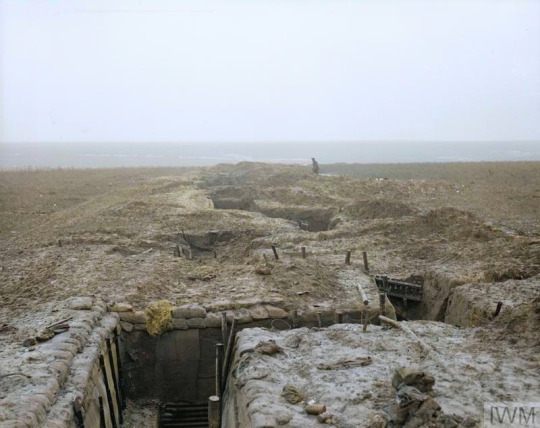
The British front line west of Trescault before the Battle of Cambrai, 10 December 1917.
#ww1#ww1 poetry#ww1 history#history#historical photos#american history#military history#world war i#world war one#the great war#The First World War#the great war 1917#historical photography#photography#vintage photography
103 notes
·
View notes
Text

IWM (Q 7278) Photograph taken at the Tank Driving School during the special training for the Battle of Cambrai at Wailly, 20 October 1917. Over 400 tanks were gathered for that training.
35 notes
·
View notes
Text
Almost 500 British tanks took part in the first battle of Cambrai, France, on November 20th, 1917
The war ended a year later
(More under the cut)
So many people think tanks were a driving force of ww1
No
Ww1 was fought by artillery and infantry
Tanks only came into the equation as the war was grinding to a halt
Most of the tanks were disabled due to mechanical issues or destroyed by artillery as the Germans took back most of the land they had lost
What few did survive are now being painstakingly preserved and taken care of in museums, to my knowledge
Though many of the advancements made to help speed the fight along only came into the equation when the war was ending, such as tanks, or the widespread use of man portable machine guns that didn't require a crew to use
They changed warfare forever
It was
For a brief 2 decades
The bloodiest conflict in human history
More than 37 million casualties, comprised of both military and civilian alike
How much impact can one man have on the world?
How many young men left thinking it was their grand adventure
That they'd come home telling stories of valor and heroism
Only to be taken out by a random artillery shell, or, if they did come home, come home with PTSD and shrapnel permanently embedded in them
And these old men continue to bicker amongst themselves and expect us to throw ourselves to our deaths for them
To fight *their battles*
2 notes
·
View notes
Text
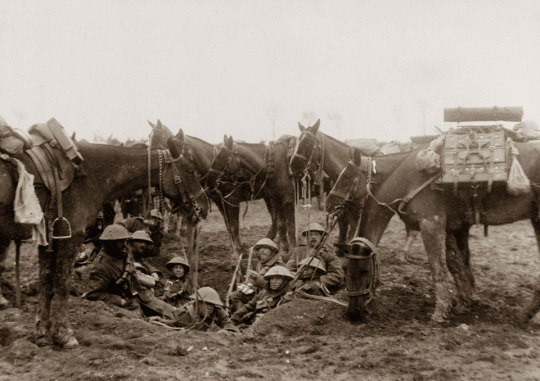
Cavalrymen resting in a shell hole on the Arras-Cambrai Road during the Battle of the Scarpe, April 1917.
13 notes
·
View notes